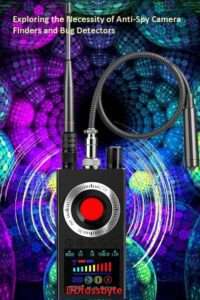In today’s digital age, concerns about privacy and security are paramount. With the increasing prevalence of surveillance and eavesdropping, it’s essential to be proactive in protecting your personal space. Anti-spy camera finders and bug detectors have emerged as valuable tools in this regard. This article will delve into whether you need these devices and provide insights into how they operate.

Hidden cameras and bugs are becoming increasingly common, as they are becoming smaller, cheaper, and easier to conceal. These devices can be used to spy on people in a variety of settings, including hotels, rental properties, and even private homes.
Understanding the Need
Before delving into the mechanics of anti-spy camera finders and bug detectors, it’s crucial to assess whether you require these tools. The necessity largely depends on your circumstances and concerns.
If you value your privacy and suspect that hidden cameras or audio bugs might compromise it, these devices can offer peace of mind. They are especially useful for:
- Home Security: Protecting your home from potential intrusions or hidden surveillance devices.
- Business Environments: Safeguarding sensitive information in corporate settings.
- Traveling: Ensuring privacy in hotel rooms or rental properties.
- Personal Privacy: Protecting your personal space and conversations from prying eyes and ears.
If any of these scenarios resonate with you, it might be time to consider investing in an anti-spy camera finder or bug detector.

How They Work
Anti-spy camera finders and bug detectors operate on the principle of detecting electromagnetic signals emitted by surveillance devices. Here’s how they work:
- RF (Radio Frequency) Detection: Many hidden cameras and audio bugs emit RF signals to transmit data. Anti-spy devices are equipped with RF detectors that can identify these signals. When you sweep the area with the device, it will alert you if it detects any suspicious RF emissions.
- Lens Detection: Anti-spy camera finders often use specialized lenses or LED lights to locate hidden camera lenses. When you look through the device’s viewfinder or use the built-in light, it can reveal the presence of camera lenses that are otherwise invisible to the naked eye.
- Audio Signal Detection: Bug detectors can identify audio signals transmitted by hidden microphones. They typically include audio sensors that can pick up even faint sounds. By carefully scanning an area, you can pinpoint the source of audio surveillance.
- Wire Detection: Some bug detectors can also identify hidden wires or cables that might lead to surveillance devices. This is particularly useful in uncovering elaborate spying setups.
- Frequency Scanning: Advanced anti-spy devices can perform frequency scans to identify unusual or unauthorized frequencies in the vicinity. This can help detect sophisticated eavesdropping equipment.

If you are concerned about being spied on, you may want to consider investing in an anti-spy camera finder and bug detector. These devices can help you to identify hidden cameras and bugs by detecting their RF signals.
There are two main types of anti-spy camera finders and bug detectors:
- RF detectors: These devices detect the radio frequency signals emitted by hidden cameras and bugs.
- Laser detectors: These devices shine a laser beam on the area being scanned and look for the reflections from hidden camera lenses.

When choosing an anti-spy camera finder and bug detector, there are a few things to keep in mind:
- Sensitivity: The detector should be sensitive enough to detect the hidden cameras and bugs that you are concerned about.
- Range: The detector should have a long enough range to scan the area that you need to check.
- Ease of use: The detector should be easy to use, even if you are not familiar with technology.
- Price: The detector should be affordable.

Anti-spy camera finders and bug detectors are valuable tools for individuals and organizations concerned about their privacy and security. By understanding their functionality and assessing your specific needs, you can make an informed decision about whether these devices are essential for your peace of mind. In an era where privacy is a precious commodity, staying one step ahead of potential threats is a wise choice.
